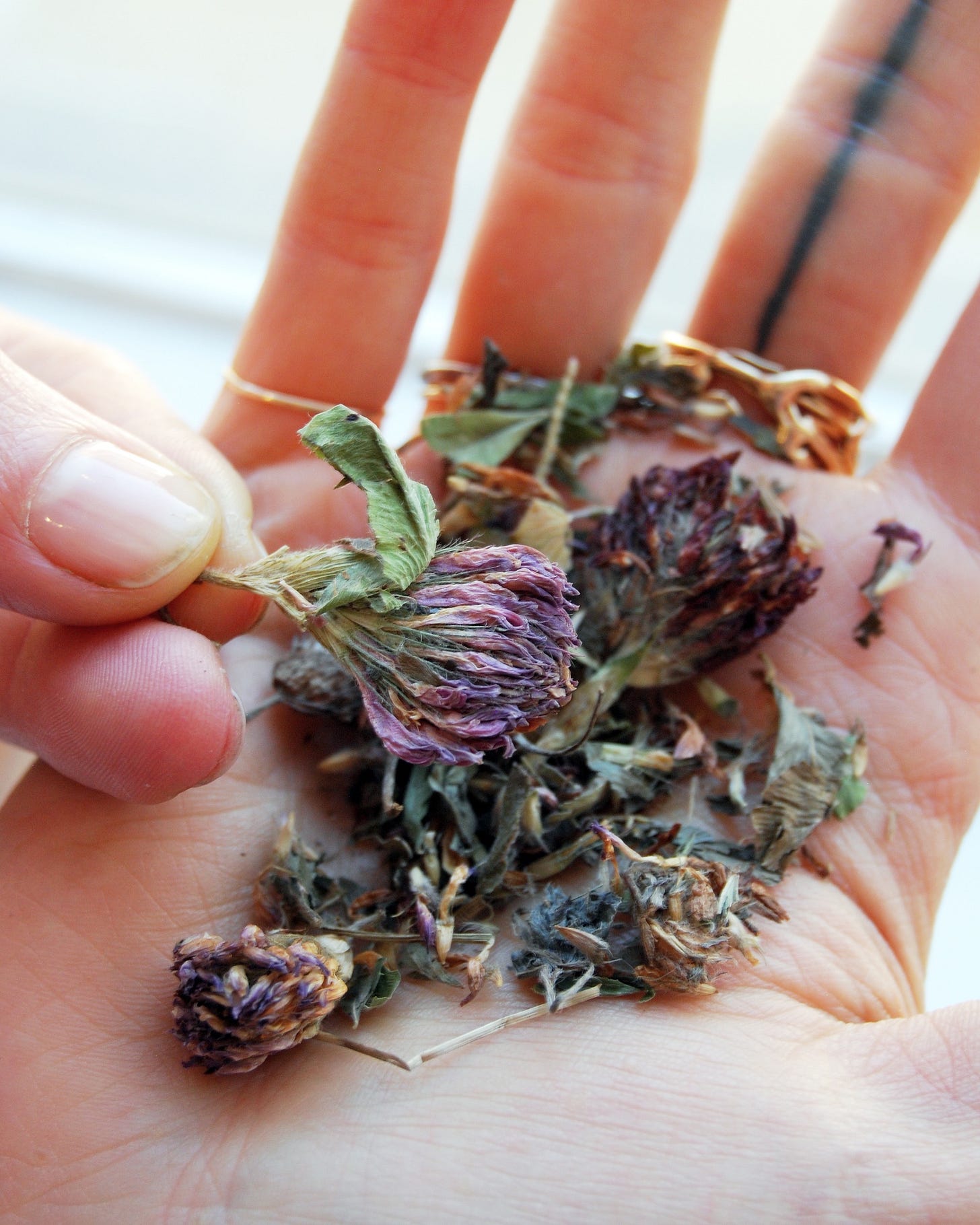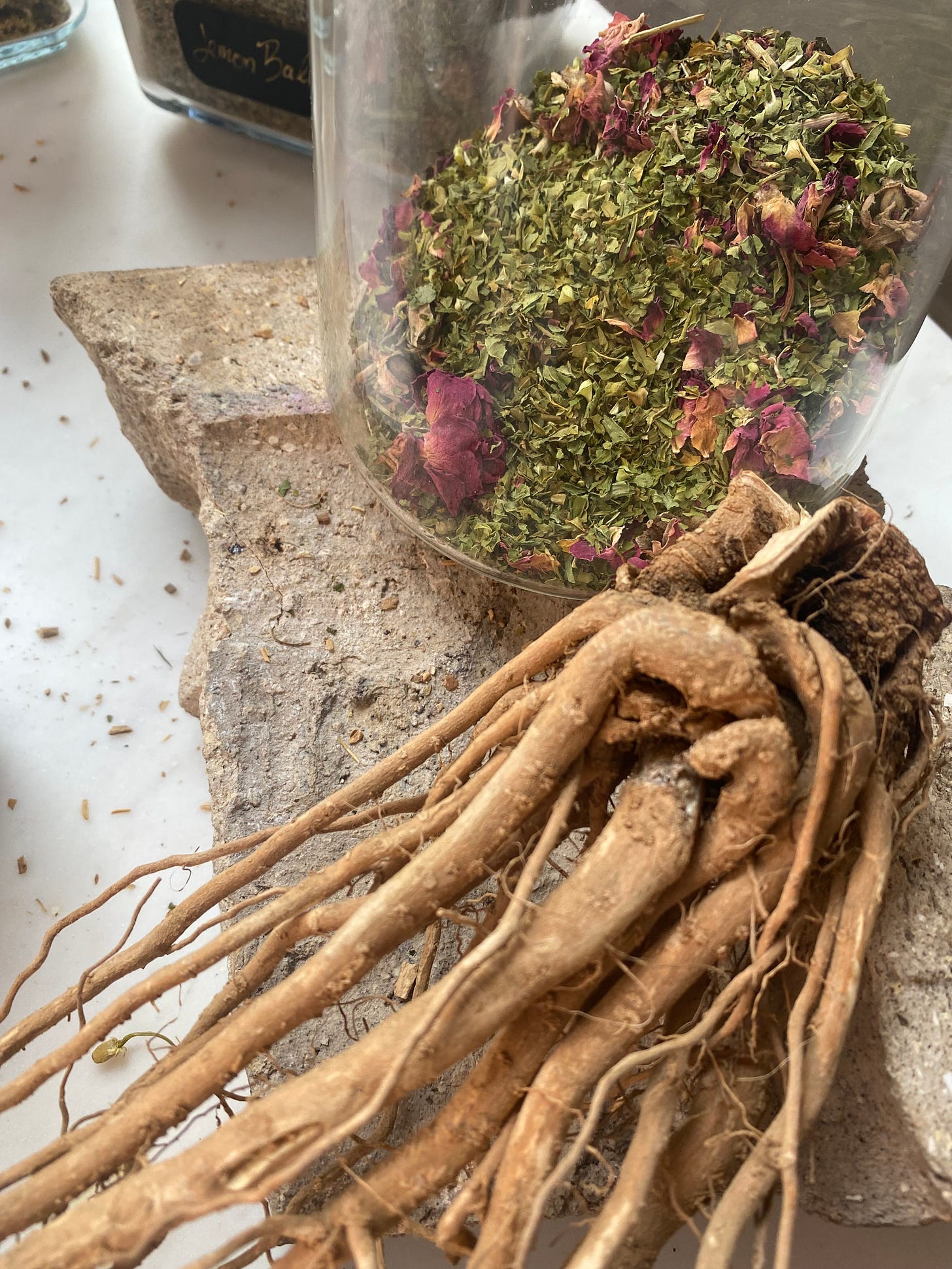Well-Being: Herbal Support for Hormone Balance with Rachelle Robinett
A TON of valuable information on using herbs to balance hormones
I’m so excited to welcome my friend and herbalist, Rachelle Robinett, as a guest on today’s newsletter. Rachelle and I connected years ago, and I’ve always been a big fan of her work and her writing. She is a wealth of knowledge on all things herbs and plants (and inspiring in so many ways!). I’m incredibly lucky to call her a friend, and I’m so grateful for her willingness to share so much here today with my community. I hope you enjoy this post and all the herbal wisdom about women’s hormones that Rachelle has to share.
From Rachelle:
Firstly, hello! It’s a pleasure to be sharing this information with such a special community. I’ve long-long been an admirer of Ali’s work, and then enjoyed meeting and making a friendship some time ago. Being here to teach to this group now feels similar—I hope we’ll be friends for years to come. And now, on with the show…
What are Hormones?
Hormones are chemical substances (also referred to as signaling molecules) produced in the body (we call this “endogenous”) that enter the circulatory system in order to control the activity of cells and organs, and to affect almost all processes in the body.
It’s also important to note that “hormone balance” doesn’t necessarily refer to sex hormones (though that’s what most people are implying when using the phrase). That’s because hormones broadly can be grouped into sex hormones, stress hormones, and sleep hormones.
There are more than 200 hormones and hormone-like substances in the human body and they’re essential for digestion, metabolism, growth and sexual development, reproduction, respiration, mood and sensory perception, tissue function, sleep, excretion, lactation, stress induction, movement, and more.
In the stress hormone category, we have the notorious cortisol. Aka “the stress hormone.” This hormone is produced by the adrenal gland and helps us stay healthy and energetic. Its main role is to control physical and psychological stress. In dangerous conditions it increases heart rate, blood pressure, respiration etc. In stressful times, the body secretes cortisol to cope up with the situation. Cortisol is also a powerful anti-inflammatory, even when secreted at normal levels. But, at chronically elevated levels it leads to a very long list of problematic conditions.
Common Causes of Sex-Hormone Imbalances:
“Balance” is a dynamic state, as we all know, and in terms of hormones, certain phases of life result in imbalances naturally. For example during puberty, menstruation, and pregnancy. However, the problematic, and chronic hormone imbalances that plague most people with symptoms are commonly caused by one or several of the following reasons:
Being overweight or imbalanced body composition: Excess fat, particularly visceral fat, produces hormones like leptin and estrogen, leading to resistance and imbalances. It contributes to insulin resistance, where high insulin levels affect other hormones and increase the risk of type 2 diabetes. Chronic inflammation from excess fat disrupts hormones such as cortisol and sex hormones, affecting reproductive health and metabolic processes. Additionally, excess weight can impact thyroid function, further complicating hormonal balance and overall health.
Stress: Chronic stress is one of the main reasons women become estrogen dominant. (See below for more details on estrogen dominance.)
Environmental exposure to xenoestrogens: Thousands of synthetic products contain xenoestrogens, industrial chemicals that mimic the behavior of estrogens and disrupt hormone balance.
Birth control pills and hormone replacement therapy (HRT).
Estrogen Dominance: Simply, too much estrogen. There are two usual causes for this: Hormone replacement therapy (HRT) or lifestyle.
Balance: How-to!
Aim for a healthy body composition (weight, body-fat percentage, adequate muscle, and beyond).
How to eat for hormone balance:
Consume the best quality, nutrient-dense, and varied diet you can! You’re in the right place here with all of the absolutely beautiful recipes that Ali provides. <3
Minimize or eliminate processed food if possible.
Aim for mostly plant-based.
Eat healthy fats, in moderation.
Aim to avoid sugar and refined carbohydrates: These destabilize blood-sugar levels, tax the pancreas, can contribute to weight gain, and cause the body to overproduce adrenaline and cortisol, thereby overworking the adrenals.
Aim for lots, and lots of fiber: Fiber helps remove excess estrogen from the body and helps stabilize blood sugar levels which is critical for optimal hormone balance. This ingredient is KEY for regular, daily detoxification. If we’re not properly eliminating every day, we’re reabsorbing what our liver already attempted to clear from our body once, causing it to work overtime.
Be mindful with caffeine: Excess stimulates adrenals to release more cortisol, which causes an imbalance, and can eventually overtax the adrenals, which can lead to estrogen dominance and estrogen/progesterone imbalance. I like to recommend one cup per day, max, if possible.
Filter your water: Thanks to runoff and pollution, hormone-disruptors are rampant in our water supply. Look for a triple-stage filter: a sediment filter, a ceramic filter, and an activated charcoal filter.
Support your liver! More on that in the herbal section below, though it’s worth noting that the best way to “detox” is simply to mind what goes into our bodies—via food and drink, the environment, and on our skin.
Minimize or replace alcohol: Drinking appears to increase the amount of estrogen in women's systems, and may also lower progesterone. Alcohol damages cells in the testes which produce and secrete testosterone. Alcohol can increase cortisol, and may increase the conversion of testosterone to estrogen.
Reduce stress: When stressed, cortisol levels spike and the body must use up its progesterone to keep up. That means, less is available to balance estrogen – leading to increased estrogen levels (and lower testosterone). Excess estrogen will cause the pancreas to overproduce insulin, so we can’t burn fat efficiently. Decreased testosterone leads to less muscle mass, and increases fat accumulation. Food allergies also cause a form of stress for the body so if possible, identify what you’re allergic to and avoid it.
Exercise: The mental benefits of aerobic exercise have a neurochemical basis. Exercise reduces levels of adrenaline and cortisol. It also stimulates the production of endorphins, chemicals in the brain that are the body's natural painkillers and mood elevators. Exercise can speed up the liver’s detox processes, sharpen insulin sensitivity, boost weight loss, help mitigate mood swing problems associated with estrogen dominance, and reduce levels of stress hormones in the body.
Consider your environment: Thousands of synthetic products contain xenoestrogens, industrial chemicals that mimic the behavior of estrogens and disrupt hormone balance. Switch out chemical-filled personal care products for safer versions that are free and clear of any synthetic compounds such as parabens and sulfates. And, refer to the liver support points above and below because this organ is doing the daily work of protecting us from environments which will never be entirely free of pollutants.
Sleep regularly and enough. :)
PCOS SIDE NOTE: Polycystic ovary syndrome (PCOS) is a hormonal disorder common among women of reproductive age. Symptoms include infrequent or prolonged menstrual periods or excess androgen levels. The ovaries may overdevelop follicles and fail to regularly release eggs. About 75% of all PCOS is driven by metabolic syndrome, which is to say that it’s caused by a metabolic situation and so needs to be treated first and sometimes only with diet and lifestyle adjustments. (That is: We’re treating the cause, not the symptoms.)
Herbs for Hormone Balance
PHYTOESTROGENS: Plant-derived “xenoestrogen” compounds that mimic the structure of estrogen in the body and have the ability to create both estrogenic or antiestrogenic effects. Some phytoestrogen (foods and herbs) include:
Linseed (flax)
Licorice root
Hops
Classic Phytoestrogenic Herbs for Hormone Balance:
Red clover: A legume (we use the flower) or common “weed” that contains a high concentration of phytoestrogens that mimic estrogen in the body—acting as both anti-estrogens OR as weak estrogens to create balance.
Drink it as a tea or find it in *high-quality capsule form!
Black Cohosh: One of the musts for menopausal symptoms of any kind, but also excellent for PMS and sexual hormone imbalances generally. (Black cohosh suppresses luteinizing hormone, high levels of which are connected to polycystic ovary syndrome and excess testerone levels.) It may also prevent growth of hormone-dependent cancer cells.
*Capsule or tincture!
Chaste Berry / Vitex: The single most common herb I recommend to women with hormone imbalances (or a desire to keep hormones balanced)! This herb receives rave reviews from women of all ages looking to reduce symptoms of hormone imbalance, from skin to mood, to discomfort and beyond.
*Tincture or capsule form.
Motherwort: Motherwort is one of the more active but non-aromatic members of the mint family, useful for treating menopausal and PMS anxiety as well as PMS-induced irritability, menstrual cramps, PMS edema, amenorrhea, back pain, uterine fibroids, and more.
Tea, *tincture, or capsule.
Licorice: Very commonly used (nearly ubiquitous) in formulas for relief from symptoms of hormone changes. Licorice is also an adaptogenic herb that can help restore energy and optimal cortisol levels in the body. Additionally, this herb is liver-protective (“hepatoprotective”) and helps prevent damage by many of the chemicals that are known endocrine disruptors.
Fun fact: Licorice helps improve the absorbability of other ingredients in herbal formulas (we call this a “bio-enhancer”) which is another reason for its frequent appearance in herbal products.
Drink as a tea, take as a tincture, or find in a blend. Use only as directed.
Special note: One of the most beautiful, timeless, and effective formulas for treating female hormone imbalance includes Motherwort, Chaste, Licorice, Black Cohosh, and Sage. A must!
*Use code RACHELLE for 20% off all NOW products.
*Use code Herbalismrach for 25% off all Nature’s Answers products.
Other Herbs for Hormone Balance:
Maca: A now well-known Peruvian tuber that stimulates the hypothalamus and pituitary gland, thereby improving the function of all the endocrine (hormone producing) glands. It’s also rich in beneficial plant sterols that are biochemically related to hormones such as estrogen, testosterone and progesterone. This one is known for libido enhancement!
Consume as a “gelatinized” powder (more absorbable than non-gelatinized), tincture, or capsule.
Adaptogens such as ginsengs, ashwagandha, or cordyceps: In addition to stress-management techniques, adaptogens that help improve our resilience to stressors can have an overall beneficial effect on hormones.
Fenugreek: Contains saponins believed to increase testosterone production. Is used as a “galactagogue” (lactation stimulant) during periods of nursing.
Raspberry leaf: An astringent and smooth-muscle relaxer that helps relieve cramps. (Also high in nutrients that are key for hormone balance.)
Dandelion root: Digestive bitter and liver support that aids in the detoxification of excess estrogen hormones.
Cramp bark: Relieves menstrual cramping and cramping of the limbs from pregnancy.
Yarrow: Can help regulate or reduce heavy menstrual bleeding. (We call this a “styptic” or blood-stopping action.)
Wild Yam: influences the production of estrogen and progesterone (but isn’t a phytoestrogen
Angelica: Used to build blood and regulate cycles.
Shatavari: A nourishing tonic for women during all stages of life that helps to balance hormones and menstruation, enhance libido and fertility, and reduce menopausal symptoms.
Additional Resources
Herbalism for Hormone Balance: online course
Functional Health Practitioners:
Wendy Warner (women’s health focus)
Susannah Kerwin (my practitioner, who I love)
Menopause + Perimenopause: Ask the Herbalist podcast episode
PCOS & Hormone Balance: Ask the Herbalist podcast episode
Women’s Health Fertility: Supplement recos, Ask the Herbalist podcast episode
Liver Support: Supplements recos
Herb Sourcing information: Ask the Herbalist podcast episode
Rachelle is a writer, artist, naturalist and Registered Herbalist dedicated to exploring the human experience via creative explorations and expressions of natural-ness. She is widely regarded as a vanguard in wellness and a thought-leader—frequently collaborating with industry-leading partners to participate in shaping the future of natural health.
Her first book is forthcoming from Penguin Life in Summer, 2025. Read more of her writing on Substack.










This is such a great resource! It is going on the SAVED list. I was so excited when I saw Rachelle's name as I follow her already!
It’s such a pleasure to be here, Ali! Thank you for sharing space. I hope the info + herbs benefit your community! 🌿🤲